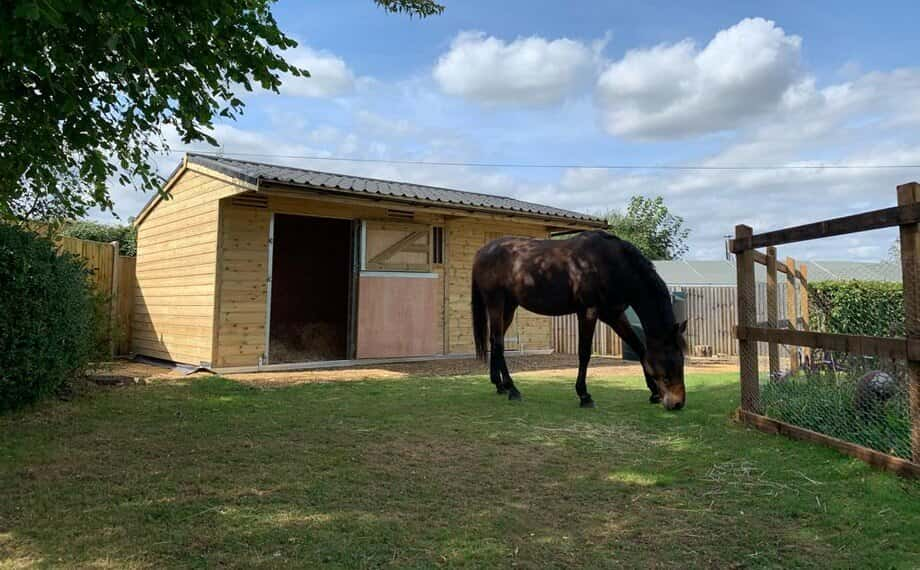This year, the early summer weather is a little bit hit and miss. One moment it’s sunny, and the next we’re donning our rain macs! Hopefully, we’ll soon be slapping on the Factor 50 as the summer establishes. However, as the heat begins to vamp up, it’s not just us humans that will need some extra care and protection. Looking after horses during hot weather is very important, so here is our advice on how to shield them from the effects of the sun and heat.
A constant supply of water
Horses need access to a constant supply of clean, fresh water to ensure they do not dehydrate. A horse can drink a lot of water during the heat, so be prepared to top up their water trough at regular intervals throughout the day. When buckets of water and water-filled troughs become warm, horses may find them unpalatable – keeping the water fresh will help encourage them to drink it. Water is vital to a healthy digestive system in horses. Keeping hydrated allows their digestive system to pass food along the gut easily, lowering the chances of a horse suffering the effects of colic.
It’s a good idea to have more than one water source available in the field so that if you have more than one horse you will help prevent some horses being chased away from drinking by other dominant horses in your herd. Similarly, try and keep your water troughs away from the corners of the enclosure to prevent a horse being cornered into a small area by another horse.
Shade and shelter
During warm weather, horses will seek shelter from the heat of the sun. If you do not have a natural shady area to rely on, you will need to create one. When turned out, a horse stable or field shelter will provide great protection from the sun and all other kinds of weather throughout the year. In extreme heat, you may decide that stabling horses during the hottest times of the day is the safest option (as long as the stables offer appropriate ventilation).
Remember, sun cream isn’t just for humans! Horses with pink skin and grey or white hair are particularly susceptible to burning so make sure you cover any pink areas on a horse with some (horse specific) cream – you will do best to test a small area of their skin first, particularly if they have never had sun cream applied before, to make sure they are not allergic). If your horse does become sunburnt, ensure they are taken out of the sun as soon as possible and cool the burnt area with water. Consult your vet about which products are available to sooth and rehydrate your horses’ skin.
Curb the flies
Flies are not just annoying to horses, if they suffer a fly bite, they may suffer a nasty allergic reaction. Prevention is always better than cure, so do everything you can to limit your horse’s exposure to flies as much as you can. Keep their stables clean and pick up muck regularly to so flies are less attracted to their grazing and living spaces – make sure the muck heap is as far asway from horses as possible otherwise all your poo cleaning efforts will be pointless. Fly rugs, masks and fly repellents can be used (be sure to apply in the right way and the correct dosage). During the heat, some owners choose to keep their horses inside during the day and out at night to help limit their exposure to nuisance flies and the threat of Sweet Itch. Additionally, always keep an eye on fields to ensure no poisonous plants for horses are present, as ingestion can cause serious harm.
Feed for Horses
Proper nutrition is essential, especially during the summer months when horses need energy to cope with the heat. Consider incorporating hydrating feeds or wetting down hay to ensure your horse stays hydrated. Also, be cautious of unauthorised feeding of horses, which can lead to digestive issues or worse. Educate others about the dangers of feeding horses without permission, as they might inadvertently give them harmful treats or inappropriate food.
Homemade Horse Treats
Providing homemade horse treats can be a delightful way to care for your horse in the summer. These can be made with natural ingredients and tailored to your horse’s dietary needs. Popular options include apple and carrot-based snacks, but always ensure that the ingredients are safe and suitable for equine consumption.
Keep calm and cool down
Just like us, the heat can affect the usual behaviour and manner of your horse, so try to keep your horses activities to a minimum during extreme heat, to give your horse the best chance to stay cool and hydrated, to rest and conserve energy. Optimise the cooler mornings and evenings to exercise (or travel) if needed but keep the session short and treat them to a sponge/hose down to make sure they are thoroughly cooled off after riding.
The British Horse Society state that the signs of heat exhaustion are as follows:
- Fast, shallow breathing (panting)
- Nostril flaring
- Increased rectal temperature
- An irregular heartbeat
- Decrease appetite and thirst
- Slow recovery after exercise
- Muscle spasms
- Reduced performance.
If your horse is showing signs of heat related illness please contact your vet immediately, move them into the shade and start to cool the horse by continuously applying cold water over the horse’s body until help arrives. Heat exhaustion is very serious in horses, so it is important to act quickly.
In general, a slower pace of life during hot, sunny weather is preferred, to ensure your horse is kept healthy and well during the summer months. Water and shelter are key so make sure you have these two necessities in abundance. Please do contact us if we can help with the horse shelter requirements in anyway. We would love to help.

Get in touch
Want to know more about choosing low-cost, high-quality stables? We’re happy to answer all your questions. Call 01233 884502, email info@nationalstables.co.uk or send us a message and we will respond ASAP.




